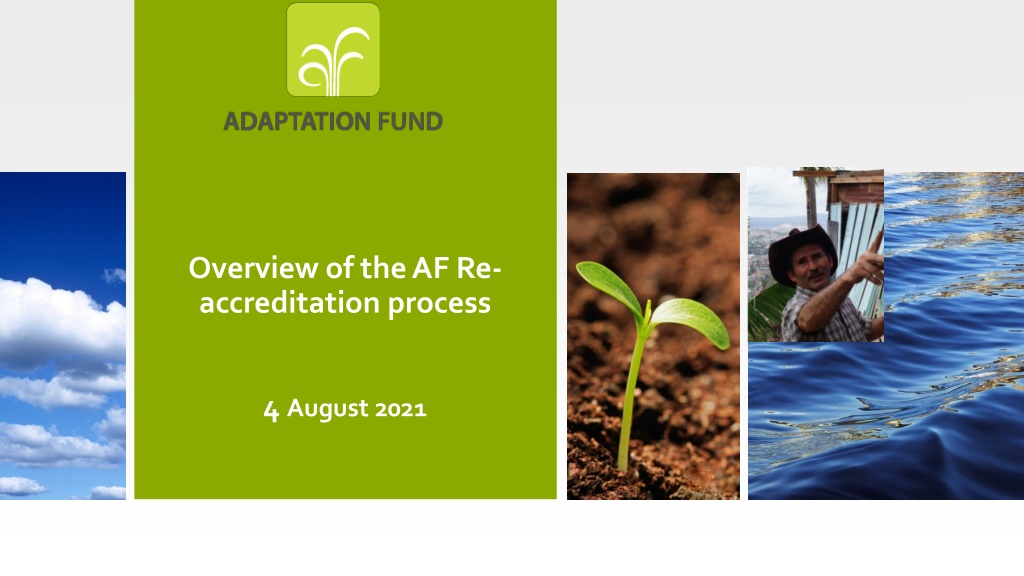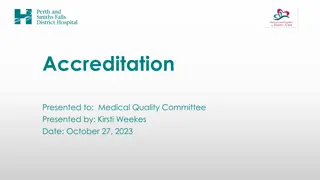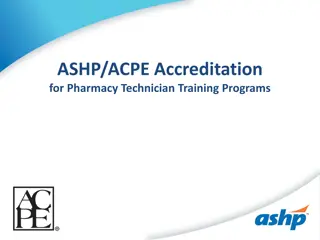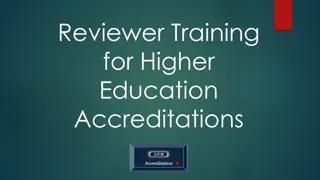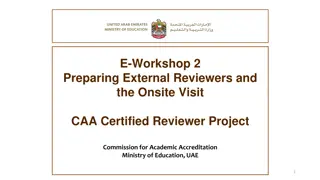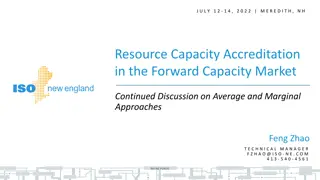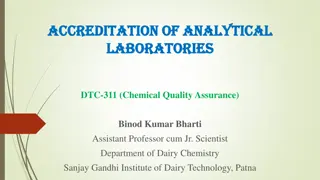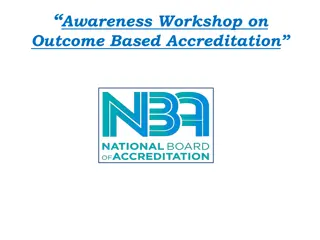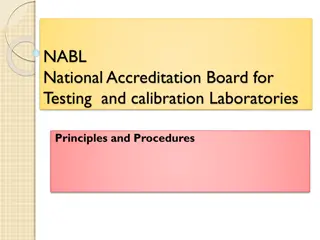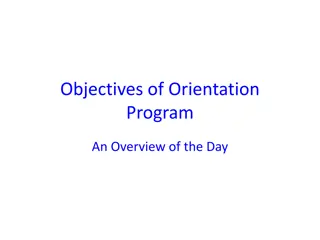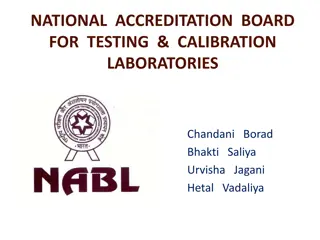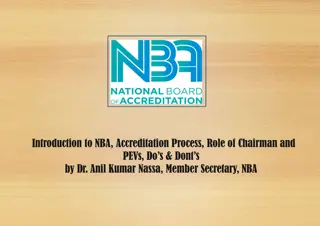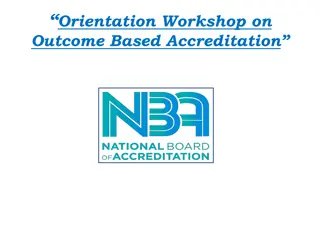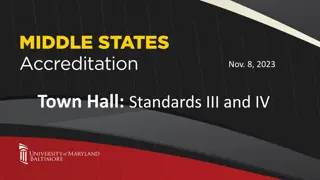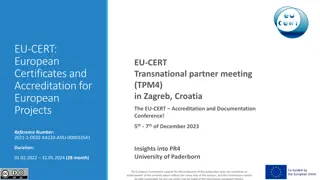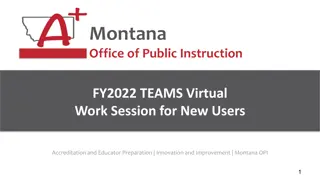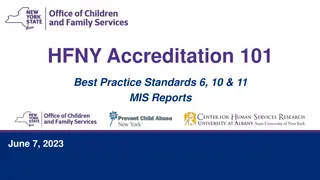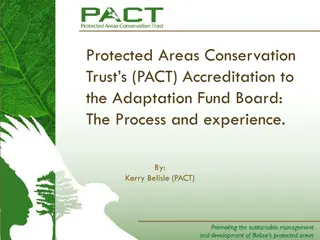Overview of the AF Re-accreditation Process - Key Points and Timelines
Accreditation with the AF is valid for 5 years, after which re-accreditation is necessary. The process involves describing any organizational changes, providing updated documentation, and starting early to avoid gaps. Important timelines include notifications, application submission, and acquisition of re-accreditation within 3 years. Grace periods can be requested for ongoing project implementation. Implications of accreditation status determine eligibility for funding proposals and participation in AF activities.
Uploaded on Oct 01, 2024 | 0 Views
Download Presentation

Please find below an Image/Link to download the presentation.
The content on the website is provided AS IS for your information and personal use only. It may not be sold, licensed, or shared on other websites without obtaining consent from the author. Download presentation by click this link. If you encounter any issues during the download, it is possible that the publisher has removed the file from their server.
E N D
Presentation Transcript
Overview of the AF Re- accreditation process 4 August 2021
Background Accreditation is valid for a period of 5 years An organization can change significantly in five-years and therefore the process of accreditation renewal must be commensurate with any potential changes to the organization. Applicants is requested to describe any changes that have occurred since its accreditation with AF and provide the most up-to-date supporting documentation in compliance with the re-accreditation criteria. It is important to start the process early - avoid a major gap between accreditation expiration and the granting of re-accreditation.
IEs Re-accredited to date 54 IEs accredited to date 31 IEs have been re-accredited (57%) 16 out of the 31 IEs re-accredited IEs are NIEs (about 52%) LAC (8); Africa (6) & Asia (2) This reinforces AF s commitment to Direct access and the importance of country ownership and building national capacity in adaptation
Important Timelines Notification by the secretariat: notification letters to IEs 18 months prior to the expiration of the entity s accreditation o The online accreditation system also generates an automatic notification to IE Submission of re-accreditation application: Submit a complete re-accreditation application with supporting documentation 12 months prior to its accreditation expiry date Acquisition of re-accreditation: within 3 years from its accreditation expiry date. How to request grace period for achieving reaccreditation? Who is eligible? IE with ongoing project implementation Required documents?: (1) An IE s official letter of request for a grace period with its request of grace period either (a) before the completion of the project or (b) within 3 years from accreditation expiry date, and with its commitment to achieve reaccreditation during the grace period ; and (2) DA s letter related to the IE s reaccreditation and the AF ongoing project implementation AFB will consider and make a decision on the request After re-accreditation application submission Screening by Secretariat Review by Panel & back- and-forth process between Panel and IE Panel s Recommendation and Board Decision.
Implications of an IEs Accreditation Status Eligible to submit a new funding proposal Eligible participate activities as IE Yes Yes to AF Eligible to be included in AF communications targeting the IE Yes Yes in (1) Accredited (1) In accreditation Process (1) Not-accredited (de-accredited) Yes No Re- No No No The accreditation team supports the project team in verifying the status of an IE at the time of submission of the funding proposals. Accreditation expiration date is indicated in the Board decision on the IE s accreditation/re-accreditation.
Re-accreditation modalities Two main routes to renewing accreditation with AF Regular re-accreditation Default re-accreditation route Focuses: (criteria 1-12) o Continued compliance with all of AF fiduciary standards, o Compliance with AF environmental and social policy (ESP) and the Gender Policy (GP) o The results of the assessment of the implementing entity s performance regarding quality at entry (QAE) and project/programme implementation. Policies and procedures related to anti-corruption and fraud, anti-money-laundering /countering the financing of terrorism (AML/CFT)
Re-accreditation modalities Contd Fast-track re-accreditation - Available to the IE that had been accredited by the GCF within four years prior to its submission of the reaccreditation application to AF. Focus: o (Criteria 1) The fiduciary standard related to the legal capacities o (Criteria 11) Commitment by the implementing entity to apply the Fund s Environmental and Social Policy (ESP) and Gender Policy (GP); and o (Criteria 12) Mechanism to deal with complaints on environmental and social harms and gender harms caused by projects/programmes; (Criteria 3 (b); 5(a) ; and 10)Policies and procedures related to anti-corruption and fraud, anti-money- laundering /countering the financing of terrorism (AML/CFT) Some additional criteria can be applied to FTR. 1. Criteria related to conditions attached to fast-track accreditation with the GCF will be assessed. 2. From the second-time fast-track reaccreditation with the Fund, financial management and integrity criteria of the fiduciary standards will be assessed along with the aforementioned three criteria
AF Fiduciary Standards and required competencies Consist of four broad categories: o Legal status; o Financial and management integrity; o Institutional capacity; and o Transparency, Self-investigative Powers, Anti-corruption measures and mechanism to address E&S and gender complaints. The description of how an entity meets the fiduciary standards should focus on any changes that have occurred within the organization since the original accreditation. The most recent supporting documentation must be submitted. Areas of assessment for re-accreditation applications depend on many factors: o Regular re-accreditation vs fast-track re-accreditation o With or without AF Funded project
With or without AF funded Project Section 7 Section 8 Section 9 Section 6 Project implementation Planning and Quality-at- entry Review Project Monitoring and Evaluation during implementation Project closure and final evaluation Project preparation and appraisal No Yes Yes Yes With approved AF funded Project but no planning and QAE No Yes No Yes With approved AF funded Project, completed planning and QAE but implementation not yet started No No Yes No With approved AF funded Project, and implementing it No No No No With approved AF funded Project, completed with a final report on completion Yes Yes Yes Yes No approved AF funded Project
AF Reaccreditation Standards contd o Demonstration of legal personality o Ability to contract with AF and authority to directly receive funds Legal status (criterion 1) o Financial Statements and External Audit requirement o Internal Control Framework o Internal Audit/Assurance and Oversight arrangements (Criteria 2-4) Management Integrity Financial and o Preparation of Business plans and budget
AF Fiduciary Standards contd o Procurement o Project Preparation and Appraisal o Project Implementation Planning o Project Monitoring and Evaluation o Project Closure and Final Evaluation Institutional Capacity (Criteria 5-9) o Policies and Framework and capacity to deal with fraud, corruption and other forms of malpractice Transparency, Self- investigative Powers, Anti-corruption measures and mechanism to address E&S and gender complaints o Mechanism to deal with complaints on environmental and social harms caused by projects o Commitment by the entity to apply the Fund s Environmental & Social and Gender policy (Criteria 10-12)
AF Accreditation standards contd Anti Money Laundering (AML) and Countering the Financing of Terrorism (CFT) : examples of supporting documentation related to the internal control framework , procurement and policies and framework to deal with financial mismanagement criteria in the accreditation application form (Criteria 3 (b); 5(a); 10 (c) ) The documentation needed to meet these requirements include: (i) Policies and procedure related to anti-money-laundering/countering the financing of terrorism; (ii) Screening system which documents all individuals and/or organizations before the entity transfers money to them; and (iii) Decision-making process that the entity follows when it identifies risks related to any individuals and/or organizations.
Relevant Resources for reference Regular Reaccreditation Application Form (English, French and Spanish) Guidance on Accreditation Standards (English, French and Spanish) The Re-accreditation Process (English & Spanish; French under translation) AF e-Learning course on Direct Access (English, French and Spanish) AF Environmental and Social Policy (English & Spanish; French under translation) AF Gender Policy (updated in March 2021) (English & Spanish; French under translation) NIE Accreditation Toolkit (English & French) Information Note for Designated Authorities for IE nomination
Thank you for your attention! www.adaptation-fund.org @adaptationfund
